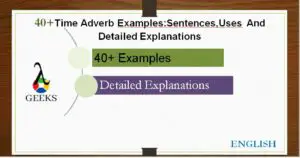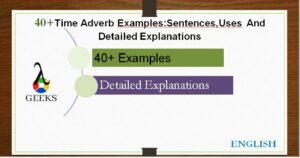This article presents some attributive adjective examples .
An attributive adjective is an adjective which usually precedes the noun it describes or modifies. It does not need a linking verb to qualify the noun.
Sometimes attributive adjectives can come after the noun or pronoun as well.
Attributive adjective examples.
- 1. I have a blue scarf.
- 2. Sara gave him a befitting reply.
- 3. Ann still uses her old laptop
- 4. She got her dream job finally.
- 5. She has blonde hair.
- 6 .The angry mob manhandled the thief.
- 7. His impeccable character will win people’s hearts.
- 8. I still remember that scary night.
- 9. I love the view of snow-clad mountains.
- 10. That deafening noise made her angry.
- 11. Her flawless essay fetched her good marks.
- 12. I like long hair.
- 13. The serpentine queue.
- 14. Jane used to write long letters to her friend.
- 15. His blue eyes met with hers.
- 16. I consider him my loyal friend.
- 17. A rectangular table is what we have ordered.
- 18. A spacious room .
- 19. The former president chaired the meeting.
- 20. He is the sole breadwinner of the family.
- 21.That utter nonsense won’t sell here.
- 22. Her main goal is to participate in the Olympics
- 23. Victorian buildings stand a class apart.
- 24. My elder brother is in the Army.
- 25. That was a beautiful memory.
- 26. A loyal employee is always an asset to the company.
- 27. It was a sunny day.
- 28. I walked through the narrow lanes.
- 29. I watched a horror movie yesterday.
- 30. I have never eaten such a delicious pudding.
- 31. They serve healthy food to their customers.
- 32. A tall man helped him to unload his luggage.
- 33. I want to try something different.
- 34. We are planning to go somewhere far.
- 35. He left a sad note before leaving.
- 36. His novels are famous for black comedies.
- 37. We laughed at her funny, spontaneous jokes.
- 38. The river cuts through a deep gorge.
- 39. He has someone else in his mind.
- 40. It is difficult to ride through this hilly terrain.
- 41. Safari through the dense forest was adventurous.
Detailed Explanation of Attributive Adjective sentences.
1. I have a blue scarf.
Here the adjective is ‘blue ‘and it is used before noun .Therefore “blue” is used as an attributive adjective example.If we use it as a predictive adjective the sentence will be like ‘My scarf is blue’.
2. Sara gave him a befitting reply.
Here the adjective is ‘befitting’. But it is used before the noun’ reply’. Therefore “befitting’ i s used as an attributive adjective.
3. Ann still uses her old laptop .
“Old’’ is the adjective here. Since it precedes the noun ‘laptop’, it is an example of attributive adjective.
4. She got her dream job finally.
“Dream” ,as an adjective is used before the noun ‘job’ to modify it. Therefore, it is an attributive adjective.
5. She has blonde hair.
“Blonde” is used as an adjective before the noun’ hair’. Since it is used before the noun ,it is an attributive adjective.
6 .The angry mob manhandled the thief.
The “angry’’ is the attributive adjective because it is used before the noun “mob”.
7. His impeccable character will win people’s hearts.
The adjective “impeccable” is used here attributively because it comes before the noun ‘character’.
8. I still remember that scary night.
The adjective “scary” comes before the noun it modifies .Therefore ‘scary’ is an attributive adjective.
9. I love the view of snow-clad mountains.
The attributive adjective here is” snow-clad’’. It comes before the noun ‘mountains’ which it modifies.
10. That deafening noise made her angry.
The adjective ‘deafening ‘comes before the noun ‘noise’. Therefore “deafening” is used as an attributive adjective.
11. Her flawless essay fetched her good marks
“Flawless” is the attributive adjective which modifies the noun ‘essay’. It comes before the noun it modifies, and thus acts attributively.
12. I like long hair.
“Long “is the attributive adjective which modifies the noun’ hair’. It is attributive adjective because it precedes the noun it describes.
13. The serpentine queue .
The adjective ”serpentine’’ is placed before the noun ‘queue’. Therefore it is an attributive adjective.
14. Jane used to write long letters to her friend.
The adjective ‘long’ is placed before the noun ‘letters ‘.Therefore “long’’ is used as an attributive adjective.
15. His blue eyes met with hers.
The adjective “blue” is placed before the noun’ eyes’. Therefore it is an attributive adjective.
16. I consider him my loyal friend.
“Loyal ‘’ is the attributive adjective which modifies the noun ‘friend’. It is attributive because it comes before the noun it describes.
17. A rectangular table is what we have ordered.
The adjective ‘’rectangular ‘’occurs before the noun ‘table’. So it is an attributive adjective.
18. A spacious room .
The adjective “spacious” is in attributive position because it precedes the noun it modifies.
19. The former president chaired the meeting.
“Former” is the attributive adjective which modifies the noun ‘president’. ‘Former’ is one of the adjectives which can only be used as an attributive adjective.It cannot be used as a predicative adjective.
20. He is the sole breadwinner of the family.
“Sole” is the attributive adjective because it precedes and modify the noun ‘breadwinner’ .’Sole’ can only be used as an attributive adjective.it cannot be placed as a predicative adjective.
21. That utter nonsense won’t sell here.
“Utter” is the attributive adjective here because it modifies and precedes the noun ‘nonsense’. The adjective ‘utter’ can only be placed as an attributive adjective. It cannot be placed as a predicative adjective.
22. Her main goal is to participate in the Olympics.
The word “main” is an adjective. Since it comes before the noun’ goal’, it is an attributive adjective. ‘Main’ can only be used as an attributive adjective .It cannot act as a predicative adjective.
23. Victorian buildings stand a class apart.
“Victorian” is used as an attributive adjective here because it precedes the noun ’buildings’ .
24. My elder brother is in the Army.
The attributive adjective used here is ‘‘elder” which qualifies the noun ‘brother’. ’Elder’ is one such adjective which can only be used as an attributive adjective.
25. That was a beautiful memory.
“Beautiful” is the attributive adjective here because it is used before the noun ‘memory’.
26. A loyal employee is always an asset to the company.
“Loyal” is the attributive adjective here because it precedes and modifies the noun ‘employee’.
27. It was a sunny day.
“Sunny” is the attributive adjective which occurs before the noun’ day’.
28. I walked through the narrow lanes.
The adjective “ narrow” is used attributively because it precedes the noun it modifies.
29. I watched a horror movie yesterday.
“Horror’’ is the attributive adjective because it precedes the noun ‘movie ‘which it modifies.
30. I have never eaten such a delicious pudding.
The attributive adjective used here is “delicious” .It is said to be attributive because it precedes the noun it modifies.
31. They serve healthy food to their customers.
‘’Healthy” is the attributive adjective here because it precedes the noun ‘food ‘.
32. A tall man helped him to unload his luggage.
The attributive adjective is “tall” and it modifies the noun ‘man’.
33. I want to try something different.
The attributive adjective used here is “different’’. It modifies the indefinite pronoun ‘something’. Attributive adjectives can be placed after indefinite pronouns.So attributive adjective is used here postpositively. (After the pronoun it modifies.)
34. We are planning to go somewhere far.
‘’Far’’ is the attributive adjective which modifies the indefinite pronoun ‘somewhere’. Here the attributive adjective is used after an indefinite pronoun. Attributive adjectives can be placed after indefinite pronouns.
35. He left a sad note before leaving.
“Sad” is the attributive adjective which modifies the noun ‘note’. It is attributive because it is used before the noun’note’.
36. His novels are famous for black comedies.
The attributive adjective used here is “black”. It precedes the noun’ comedies’ which it modifies.
37. We laughed at her funny, spontaneous jokes.
” Funny” and “spontaneous” are the two attributive adjectives. Both precede the noun (jokes) they modify.
38. The river cuts through a deep gorge.
The adjective “deep” precedes the noun ’gorge’. Therefore it is used as an attributive adjective.
39. He has someone else in his mind.
Here the attributive adjective “else” is used attributively after an indefinite pronoun. Attributive adjectives can be used after an indefinite pronoun.
40. It is difficult to ride through this hilly terrain.
‘’Hilly” is the attributive adjective used here which modifies the noun terrain.
41. Safari through the dense forest was adventurous.
Here the adjective ‘’dense’’ is placed before the noun ‘forest’. Therefore it is an attributive adjective.
Attributive adjective use-
An attributive adjective is used to give more details about the noun it precedes .Its position just before the noun it modifies gives us a straightforward description about that noun. The description can give more information about its size, colour, weight, behavior ,etc.


